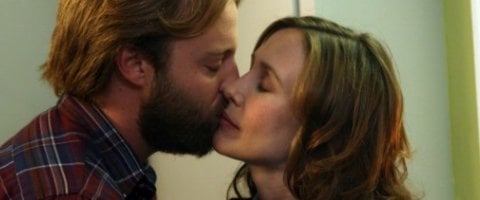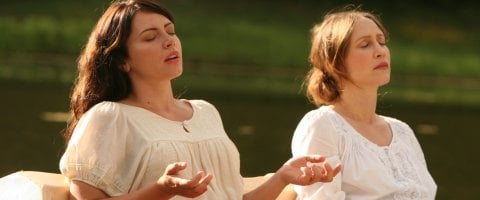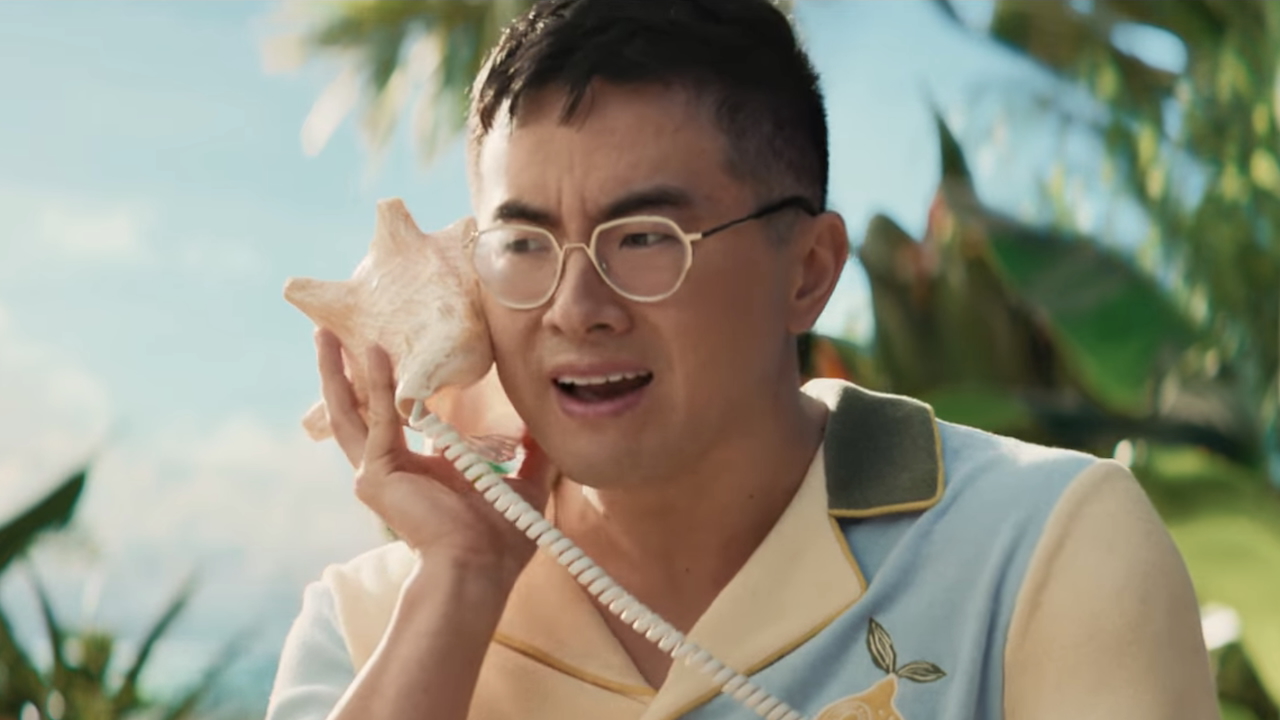Interview: What Vera Farmiga Wants You To Know About Her Directorial Debut, Higher Ground

Your Daily Blend of Entertainment News
You are now subscribed
Your newsletter sign-up was successful
There have been a lot of really good independent films in theaters this summer, from Terrence Malick's enormous visual poem Tree of Life to genre favorites like Attack the Block. But there's not one I love any more than Higher Ground, the directorial debut from actress Vera Farmiga that's a loosely fictionalized account based on the memoir by Carolyn Briggs, who joined a very intense, very Christian religious group as a teenager and slowly found herself moving away from her faith. Farmiga stars in the film as well, along with a killer supporting cast that includes John Hawkes, Joshua Leonard, Donna Murphy, Dagmara Dominczyk, and even Farmiga's own younger sister Taissa.
Back in April, when Higher Ground was part of the Tribeca Film Festival, Farmiga sat down for a breakfast meeting with a group of female journalists to talk about the movie, her experience as a female director, and what she does with all the awful scripts Hollywood sends her way. Here are some of the highlights from that conversation. Higher Ground is out now in limited release; if you want to know about the movie and why I think it's so very worth your time, you can check out my review from Sundance.
Farmiga had initially become attached to the project as an actress, but she left it when, as she diplomatically put it, " it just wasn’t shaping up the way that I had envisioned it." Then the film's screenwriter Tim Metcalfe suggested she take over as director, and as Farmiga says, "I was terrified of it."
I wanted Debra Granik to direct this, I did call her up, I didn’t blatantly ask her. She is such a mentor of mine, she mentored me through the process, especially in the editing because the editing suite is a place that actors are barred from, and rightly so, justly so.
It is the flip of a coin, a maddening flip of a coin sometimes, self-editing. I have a pretty good sense of what works in a scene. Ego always comes into play and you’ve got to keep your ego in check. Yes, there were times where I wanted to take the prettier shot or the better angle.
When production began on Higher Ground in upstate New York, near where Farmiga lives with her family, the actress-turned-director was four months pregnant, with a belly she shows off in one fantasy sequence in the film. It's incredibly rare to see pregnant women on film, and even rarer to see them working behind the camera, but the way Farmiga tells it the pregnancy wasn't even close to the biggest challenge.
I think as the pregnancy progress, so did my character through the seventies and eighties, and by the end of my film, I do look like I’ve had three kids. I think it works well for the journey of the character. I’m pretty gentle on myself. I can honestly say I’ll probably never do it again. But I’m invincible in my second trimmest of pregnancy, there’s nothing I can’t do, I feel energy like I’ve never felt. I think tapping into that was, there was a life force inside of me that was growing and I think it emanates on the screen, I do. It was tough though. We shot this in twenty-six days and I wasn’t often watching playback because I would use those times to run to the bathroom.
Your Daily Blend of Entertainment News

Higher Ground premiered earlier this year at the Sundance Film Festival, where an unusual amount of religious-themed films were also showing, including Kevin Smith's Red State and Sean Durkin's Martha Marcy May Marlene. But whereas each of those films took very specific, critical stances on fanaticism, Higher Ground is a far more questioning and gentle approach, even though it deals with extremely fundamentalist Christians living a cloistered lifestyle.
I have a deep respect for all religions and I always kind of admired men and women of great faith. My father and mother are both those people, my father especially, I’ve coveted what he had. I always yearned for that. So gosh, I don’t have a bone to pick or an axe to grind with the community. I think, to me, I find there’s two kinds of films, ones that proselytize, are made for the community trying to convert you, or other ones that poke fun at the community. I didn’t want to make either kind of film. I wanted to make a different kind of film, I wanted to make a film for believers and non-believers. I wanted to not judge this topic, the topic of not-knowing, the topic of questioning. I didn’t want to judge its characters. No character comes out of this film more enlightened than the other, even Corinne. So that’s really the approach. I wanted to be very reverent, so to speak. I wanted to be in it, I didn’t want to ride above it. I just wanted to be in it and not judge anyone.
You ought to have a perspective when you’re making a film. Mine was a gentle one. I find, to me, the story, yes, is about a woman and her life in this fundamentalist community. But on a different level it’s so much more than just a story about her relationship with God, it’s yearning on sort of the most, I think yearning is holiness in a way. I feel this is a woman who is just yearning for passion and yearning to be genuine, to come from a genuine self. Yearning for a good sense of self, yearning for intimacy in all her relationships.
The movie focuses on a number of the relationships in the life of the main character, Corinne, based loosely on Carolyn Briggs, whose memoir inspired Higher Ground. One of the most memorable relationships is the one Corinne has with Annika, a fellow member of the religious group who is also frank and funny in a way a lot of the religious zealots are. Farmiga said she had known the actress, Dagmara Dominczyk, for years after going to the same auditions, and wanted to emphasize in the film how important and valuable female friendship can be. And also how sometimes, you might imagine yourself sucking the toes of your best female friend. Really.
In the adult Corinne, we took the first two portions of her life and used that as a blueprint, and kind of forged a narrative based on our own life experiences and imagination, and what we want to see, what kind of films challenge us and delight us and one important factor was the representation of female friendship. It was a little homage we created and we wanted to portray female friendship as I know it, as I have with my own friends, as I cherish. Because I don’t see enough of that, I really don’t, and the importance of friendships between women.
When your parents are immigrants and you come from that part of the world, there’s just an automatic kindred spirit. She’s that woman that you want to be-- Dagmara is that woman. She embodies that as a human being, that sexuality, that comfort in your own skin, that maternal mother earth essence of love and voluptuousness, bodiness, and being unapologetically who she is. It’s a very seductive quality. I’ve missed her, she took a hiatus to give birth to her two sons, and I just wanted to see her back in action, especially after motherhood, which is an initiation in and of itself. She is Annika. The toe-sucking scene was a really hard one to keep a straight face. That was probably one of the hardest scenes to get through just because, god, it’s a rare thing, toe-sucking. It should be a more frequent thing.

Farmiga made her name in the grim indie Down to the Bone but is no stranger to bigger Hollywood productions like Source Code and Orphan, and like any actress with an Oscar nomination behind her, she's had many other offers that she turns down. Word got out recently that Farmiga doesn't just toss the bad scripts sent her way, but burns them in a bonfire in the backyard. We of course had to ask her about it.
Honestly, it sounds more anarchic than it is. When you live out in upstate New York, it’s actually commonplace to do bonfires because there’s many windstorms and electrical storms and limbs are always falling off of trees, I find it extremely therapeutic to gather those twigs. I love mowing lawns, I love lawn clippings, I love building fires. It’s an activity. You’ve got to do something with these scripts. And I don’t necessarily want to take them to the transfer station, to the dump where we live, because in my neck of the woods we don’t have a garbage service that comes and picks up. You have to recycle and you have to separate. It’s paper products so I could either bind them all and take them to the dump, I’m just afraid that someone will actually, they’ll be privy to things that haven’t come out yet. It is something I do, and it’s usually the poorer scripts that get ignited.
Staff Writer at CinemaBlend

